This article was updated on June 23rd, 2024
If you have a senior dog, you might already be dealing with some old dog behavior issues…. or you may just be noticing that Fido acts a little differently than he used to.
This is normal! Your dog has gone through a lot of changes as he’s grown from puppy, to adult, to senior citizen, and each of these stages has its own joys and problems.
Your senior dog may experience personality or temperament changes
Personality or temperament changes in older dogs can be caused by different things, including physical health issues, emotional upset, changes in their family or environment and more.
If your old dog’s behavior has you worried, confused or frustrated, the information on this page may help you figure out exactly what’s causing the changes and point you to tips and advice for managing them.
Important physical changes in older dogs may include loss of appetite, difficulty sleeping, and incontinence
The aging process affects dogs in the same way that it affects humans, and as Fido gets older his body will begin to let him down. As a baby-boomer myself, I know how frustrating it can be when my mind has expectations that my body can’t live up to. It’s no fun!
1. Loss of Appetite
Some dogs never stop loving mealtimes, but others lose interest in their food bowl as they age. This is normal and happens for a lot of different reasons.
BUT a sudden change in eating habits could signal a serious problem such as infection, liver or kidney problems and more.
So if Fido won’t eat sometimes you need to make a trip to your veterinarian’s office to find out what’s going on.
Here are just some of the reasons behind a gradually fading appetite in older dogs…..
- Dulling of the senses of taste and smell
- Slowing metabolism
- Dental problems such as abscesses or decay
- Canine Cognitive Decline or Dysfunction (aka Doggie Dementia)
2. Difficulty Sleeping & Restlessness
Sleeping problems are very common in older dogs, and they can happen for a lot of different reasons, including…
- Pain or discomfort
- Anxiety
- Incontinence
- Lack of exercise – physical and mental
- Canine Cognitive Decline or Dysfunction
There are also other possibilities, and Fido could even be suffering from a combination of these ‘triggers’. Luckily there are lots of things you can do to help your old dog sleep better, and for longer. Learn more about restless senior dogs.
3. House-Training Problems
Even if Fido has been perfectly housebroken since he was a pup, in his senior years he might begin to have problems ‘holding it’.
Incontinence is more likely in female dogs than in males, but it can happen in both sexes.
There are a few main causes of house-soiling in senior dogs…
- Disease/illness which leads to increased thirst, such as kidney disease or diabetes
- Chronic medication side effects
- Back issues
- Urethral sphincter mechanism incontinence (USMI)
- Poor mobility hindering Fido from getting to his toilet spot
- Canine Cognitive Dysfunction
If your older dog is peeing in the house, especially if it becomes a daily problem, can make everyone miserable, so it’s important to figure out what’s causing it to happen.
Emotional or behavior changes in older dogs may include anxiety, fear, aggression and depression
Growing older doesn’t just cause physical changes, it can cause emotional or psychological ones too. Sometimes the two are related and the emotional behavior has a physical trigger (such as pain causing your senior dog to suddenly become grumpy and snappy).
With old dog behavior, many emotional issues have their roots in physical problems. Here are some of the ones you’re most likely to see:
1. Anxiety & Fear
Personality changes can happen as dogs get older, and Fido may not be the confident, outgoing dog he once was due to anxiety about certain situations or due to physical or psychological changes.
He might suddenly be afraid of things he’s been around his whole life (like the washing machine, or the door-bell), or something that previously made him mildly anxious now terrifies him.
New things, people and experiences might make him shake and quiver.
When this happens it’s worrying and upsetting for everyone.
Things that can cause anxious or fearful behavior in senior dogs include….
- Dulling of the senses such as hearing, sight and smell
- Canine Cognitive Dysfunction (like Alzheimers in humans)
- Pain or discomfort
- Sudden or major changes in their environment
Sometimes this anxiety can simply make your dog a bit ‘jumpy’ or ‘jittery’, or more easily startled.
Other times it can cause more difficult problems such as separation anxiety, or even make your dog ‘housebound’. Learn more about senior dog anxiety.
2. Irritable & Aggressive Behavior
Although anxiety is more common than aggression, some older dogs can become irritable, bad-tempered or combative.
They might not want to be petted, get aggravated with other pets, or refuse to tolerate puppies or other dogs.
Maybe this shouldn’t be so surprising because we all know at least one elderly person who is a complete grouch!
This old dog behavior has different levels of intensity, ranging from mild irritability to all-out aggression.
It’s usually caused by…
- Pain or discomfort
- Fear or anxiety
- Canine Cognitive Dysfunction (Doggie Dementia)
- Loss of senses such as sight or hearing
If your naturally happy-go-lucky dog has morphed into Oscar the Grouch, then it’s important to get to the root of the problem. A veterinary visit is highly recommended as a first step.
Click here to learn more about the causes and treatment of older dogs who become grumpy or bad-tempered.
3. Depression
Yes, dogs can get depressed too!
Getting older isn’t easy, and Fido probably doesn’t feel great about the whole aging process.
He might…
- Be in pain
- Feel tired all the time
- Not enjoy his food
- Be unable to run and play
All these things affect quality of life, and that is important to your dog too.
Plus, senior dogs are more upset by change than younger dogs are, are less open to new experiences and their world may be shrinking as their sight diminishes.
Oh wow, now that’s making me feel depressed too!
But the good news is that there are a ton of ways that you can improve the quality of life for your older dog.
Many of them are really simple, the key is to find out what it is that’s making your dog sad so that you can help him feel better.
4. Barking
Dog Barking More Than He Used To
Many older dogs become increasingly vocal as they age, even those who have been occasional barkers up until now.
Excessive barking can be your dog’s way of expressing emotions such as anxiety or confusion, or physical problems such as pain or the repeated need to urinate (see the page that talks about old dog incontinence for help handling this).
Fortunately, for both you and your golden oldie, once you figure out why he’s barking so much there are things you can do to reduce the barking and often alleviate the underlying cause of all the noise too.
This page has all the information and advice you need…. Older Dog Barking Problems
… or is your old dog no longer barking?
If your old or senior dog no longer barks, it’s important to evaluate the situation: the root cause may be an serious underlying medical condition.
It may seem nice at first when your dog no longer barks – this means less noise in the household. However, you must be sure that there is no medical issue that your dog is now suffering from that prevents him/her from barking.
Read our post on why your senior dog no longer barks, and what you can do about it.
Sometimes changes can be positive!
Old dog behavior changes are often not the kind you want to see, especially when they signal health problems.
BUT, sometimes getting older can mellow a dog (or a person!), and years of social interaction and training can mean senior dogs are often calmer and better behaved than the younger whipper-snappers.
Your senior dog may become more loving in his later years, or life may rub the edges off a bossy/dominant or hyper-active personality.
Some dogs are ‘old souls’ and are always sensible, then there are the dogs who are eternal puppies… who look older than they used to, but don’t act that way!
Fido will age at his own rate and in his own way. Share every moment with him and enjoy the journey.
Disclaimer: This website's content is not a substitute for veterinary care. Always consult with your veterinarian for healthcare decisions. Read More.



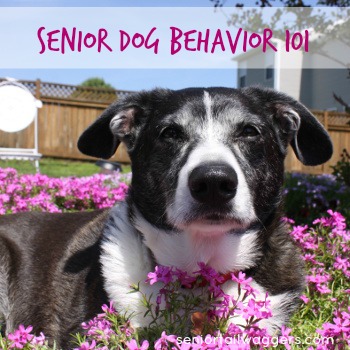
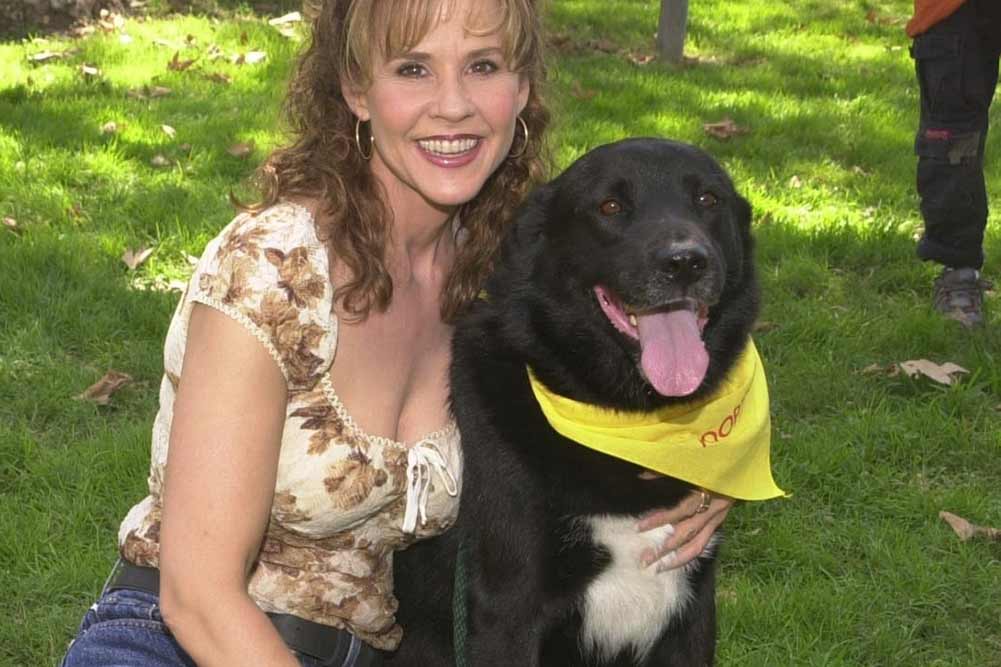


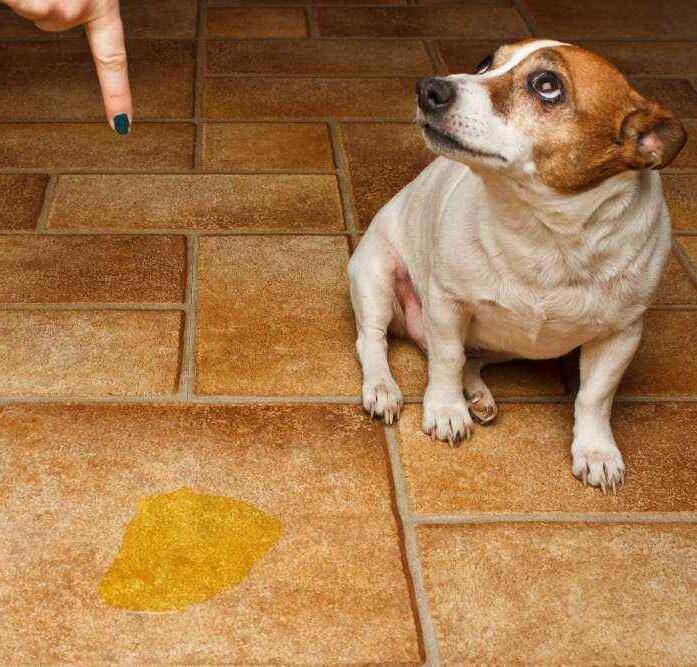


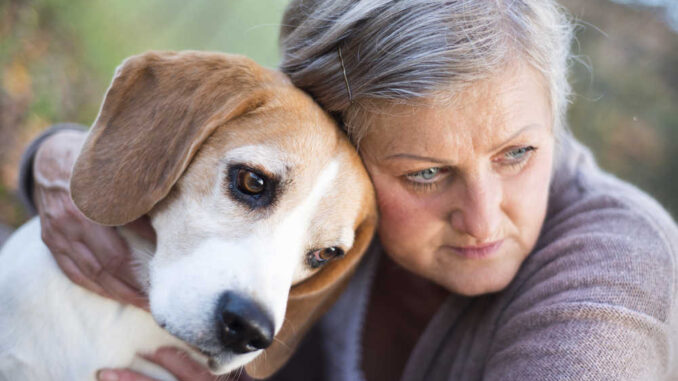
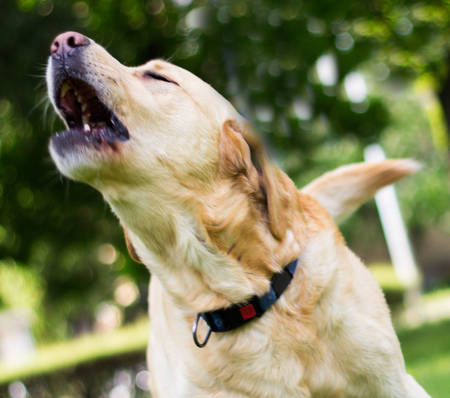
thanks for the conclusive information..
I am wondering about my dogs behavior. He can’t walk straight. His back legs give out on him. He spins, stares into corners. His appetite is good, is not incontinent, is not aggressive towards anyone. He has quit barking completely. He used to bark a lot. He is 18 yrs old. I be
My Staffordshire bull terrier is nearly 18. He’s back legs seem to be going. He’s lost a lot of weight over the last 6 months. He’s eating fine but drinking loads. He seems to have even lost wait on his head. I will be contacting my vet on Monday. He has the occasional accident in the night. He’s always been brilliant. He looks so sad sometimes but then other times he’s back to his old loving self. Currently snuggled with me on settee. TIA for any advice
Hi, our boy is 14. Hes snapping allot, very over protective of the one that feeds him, anxious and fearful, his eyesight is going. He loves his family but im worried about our safety. He will be given painkillers every morning to help with his discomfort and ill talk to the kids about their behaviour around him. Not sure what else to do, he has a blanket on every bed in the house. Hes so loved